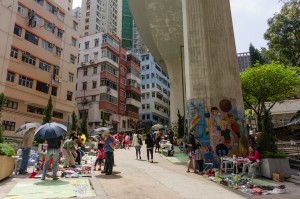Wong blames the government for pushing the belief that the ideas behind urban and rural living contradict each other. She hopes the market can help to refute this notion.
“We hope to reconnect the community through this kind of agricultural activity to form a cycle. This is what we called urban-rural coexistence,” she says.
While Wong and villagers in Ma Shi Po Village hope to awaken the public to the value of living off the land and the possibility of self-sufficiency through reviving agriculture, others have been working on organising markets to revive urban communities.
The Supporting Grassroots and Market Alliance, founded in 2012 has held various markets including the large-scale Hong Kong Bazaars Festival Market from May to July this year. Their aim is to help the grassroots to eliminate poverty and link up different people in the community.
“Market is a ‘wishing tree’ as different people can do whatever they plan [in it]. I don’t care about your identity and source of income…You and I belong to this place and we can talk about a lot of things to rebuild relationships,” says Chiu Sin-ting, a spokesperson of the alliance.
Chiu says markets create an environment where residents can mingle and exchange information about job opportunities, health advice and other things relevant to their lives. These are experiences shoppers do not encounter in malls. They also give residents the chance to start their own businesses at a low cost.

During August, Chiu and her team ran the Sham Shui Po Daytime Market on every Sunday of the month. They wanted it to be a trial flea market that would show the government how markets could address the socioeconomic needs of grassroots communities in different districts.
Compared with other markets, where daily rent is more than HK$300 per stall, the 30 vendors who joined the scheme could sell dry goods rent-free without interference from the Food and Environmental Hygiene Department. They did not need to have hawker licenses and could set up their own stalls as they wished within a designated chalk square.
The group’s plan got positive feedback from the Sham Shui Po District Council and local residents but it still took nine months to make it happen. Chiu says they ran into many difficulties due to government bureaucracy and a lack of transparency. They had to fulfill many requirements stipulated by the Lands Department and Fire Services Department. The Independent Commission Against Corruption was also involved, to check whether the selection procedure for vendors was clean and fair.
While they were in the middle of dealing with red-tape and collecting residents’ opinions, they were challenged by critics asking why the government needed to offer a free site for members of the grassroots to make profits. “They just do not understand the benefits this market brought to the grassroots,” she laments.
Vincent Cheng Wing-shun*, the district councillor for Nam Cheong North who acted as an intermediary to connect the alliance with different people in the district, says residents’ concerns were mainly about noise, traffic, hygiene issues and security.
He adds that if the flea market becomes a regular event, he believes shop owners and licensed hawkers in the district will ask why the government subsidises vendors in the market by not charging them rent or requiring they pay for licenses.
In the case of Sham Shui Po, Cheng says the trial market might not have made a big impact in helping to bring local residents together because they were already a close-knit community. But he says it did successfully strengthen the younger generation’s feelings for and ties with Sham Shui Po.

“We hope to change their views through this, so they will start to consider Sham Shui Po not only as a place with ordinary goods but also with some cultural elements. They will get to know how the grassroots live,” says Cheng.
When it comes to strengthening community ties, 28-year-old Benny Yuen Chun-wai does not need any external encouragement. Yuen grew up in Tai Po and when he was offered the chance to transform and revive Tai Po’s old Luen Wo Market, he jumped at it. He helped to transform the former market building into the Luen Wo Village, a site for craftspeople to work and exchange ideas. In September, he organised a one-off Mid-Autumn market in the grade-three listed historical building.
At the event, visitors could savour traditional local snacks and buy handicrafts as well as locally grown vegetables. There was even free hairstyling available for lower-income families.










































